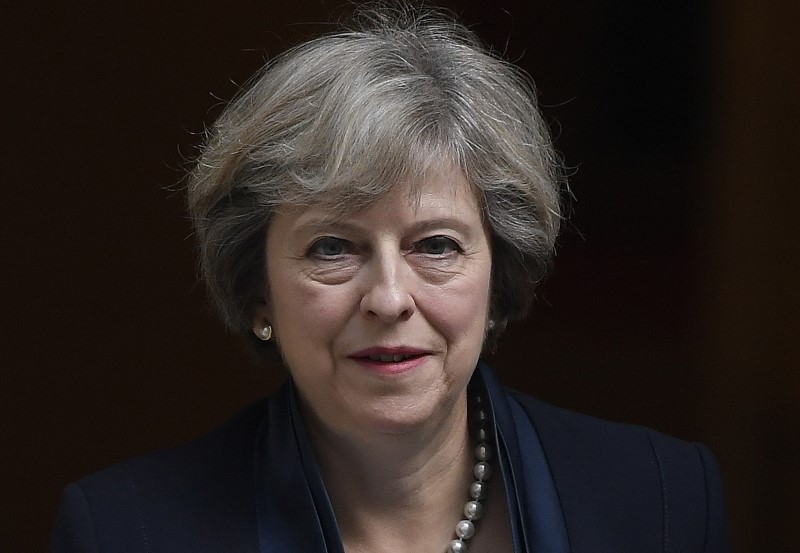By Elizabeth Piper
LONDON (Reuters) - As Europe clamours to know how Britain plans to implement its decision to leave the European Union, new Prime Minister Theresa May is giving little away, but her strategy is becoming clear.
May broke with tradition and invited media to her official country residence, Chequers, last month to film her taking charge of a potentially unruly cabinet, whose members differ widely and sometimes publicly over Britain's priorities.
She promised a "unique deal" allowing the country to secure trade deals on good terms while limiting immigration, a combination repeatedly ruled out by European leaders, who say free trade is only possible with free movement of people.
"We must continue to be very clear that Brexit means Brexit, and we are going to make a success of it," she told ministers she chose when the surprise referendum result brought her to power to bridge splits over Europe in her Conservative Party.
It was the latest iteration of a catchphrase that critics of May, who quietly backed the campaign to stay in the European Union before the referendum, say is open to wide interpretation.
May is not attending an EU summit on Friday in the Slovak capital, Bratislava, the bloc's first since Britain voted to pull out in June. Brexit will be the elephant in the room but the meeting is unlikely to shed much light on it.
She has vowed not to start divorce proceedings this year, to the frustration of her Conservative Party's pro-Brexit wing and European leaders afraid that uncertainty over ties with the bloc's second largest economy will hurt the other 27.
May's aides suggest her plan is to invoke Article 50 of the EU's Lisbon Treaty, which triggers the start of the exit, early in 2017. Until then, her critics will just have to wait.
"This is the way I operate," May told reporters on board her official plane headed for a summit in China earlier this month, describing why she was taking her time deciding whether to go ahead with a nuclear power plant funded partly by China.
"I don't just come in and say 'I'm going to take a decision' - I actually look at the evidence, weigh up that evidence, take the advice and consider that and come to my decision."
Her aides and ministers have told reporters the government will not offer a "running commentary" on talks her European counterparts say cannot begin until Britain triggers the exit.
"This is a negotiation. It is not always the right approach to start putting all your cards on the table at the start," May's spokeswoman said of the divorce talks.
MAY CALLS THE SHOTS
Until then, British civil servants are contingency planning, working out ways immigration could be controlled, lost funding from the bloc replaced and EU laws transposed into British law.
Two sources close to the preparations say they know little about where compromises might be possible or details of policies to be pursued during the negotiations but are focussed on offering options until May decides.
May has brushed aside criticism that she is trying to do the impossible by seeking a deal that will offer Britain control over migration and access to the EU's lucrative single market.
An aide said May had "been clear that she will be ambitious in her approach – and is committed to delivering both". She is also keen to present a united front.
May described a statement by "Brexit" minister David Davis this month that membership of the EU's single market was "very improbable" as his personal opinion. Aides said she wanted to ensure Britain's negotiating position was not undermined.
When her pro-Brexit trade minister, Liam Fox, was reported as suggesting Britain should leave the EU's customs union, May's office at 10 Downing Street said no decision had yet been made.
Fox was also recorded as saying Britain had become "too lazy and too fat" to seek new export markets; May's spokeswoman responded that trade ties were important.
May's aides say she is not overly worried by Davis, Fox or Foreign Minister Boris Johnson, whose appointment prompted concern abroad because of his history of offending people.
The three men all have prime ministerial ambitions and all campaigned to leave the EU. May's aides say she will stand by them, a comment aimed at reassuring some anti-EU Conservative activists and lawmakers that "Brexit means Brexit".
Davis and Fox have since stuck to the official line and Johnson has made few public comments. Two lawmakers said he was focussed on researching his brief, particularly the Middle East.
Davis reiterated to parliament this week his Brexit ministry would coordinate policy, not form it. "On responsibilities, the prime minister will lead the UK's exit negotiations and be supported on a day-to-day basis by my Department," he said.
A member of the upper house of parliament, who spoke on condition of anonymity, said allowing television cameras to film May telling top ministers what to do in the normally private setting of Chequers on Aug. 31 was calculated to underline she was in charge of the Brexit process.

"It is a scene that will be played out again and again," the source said.